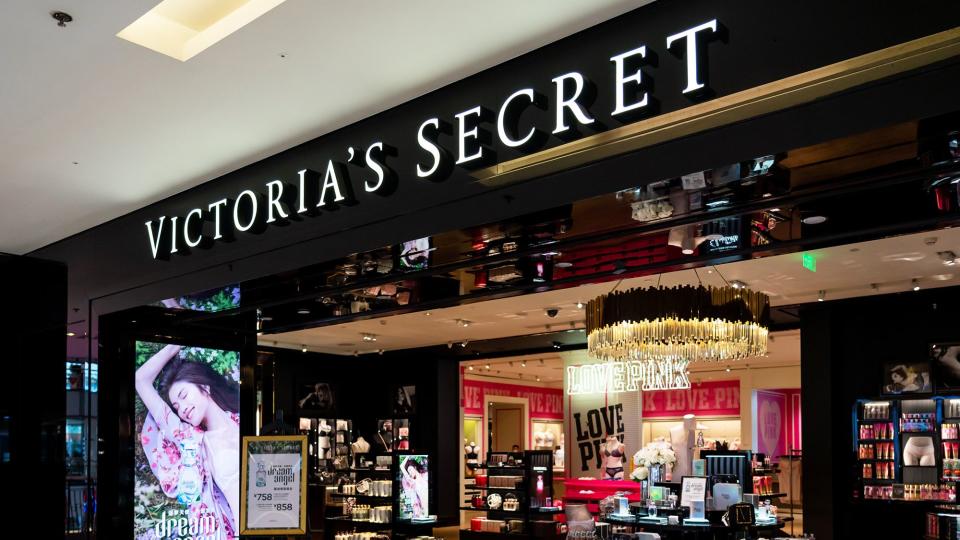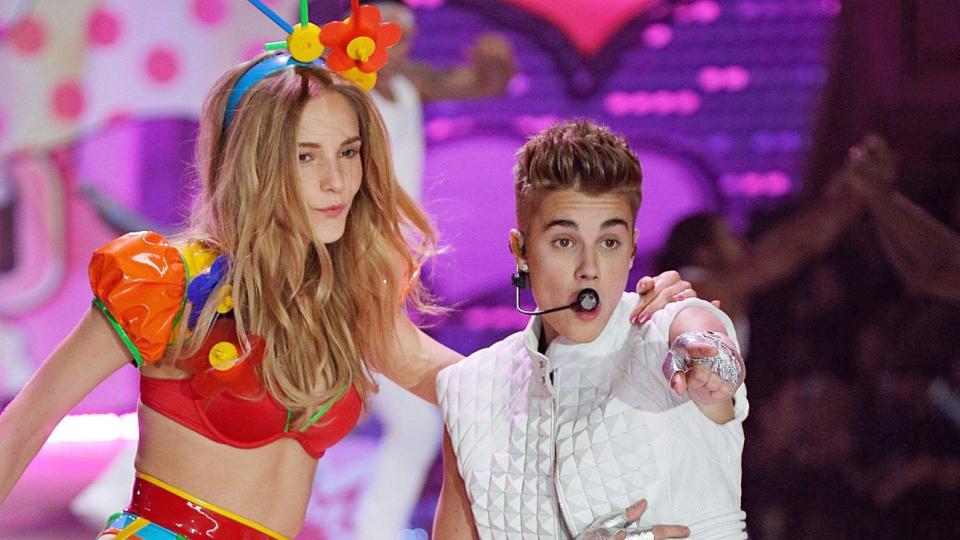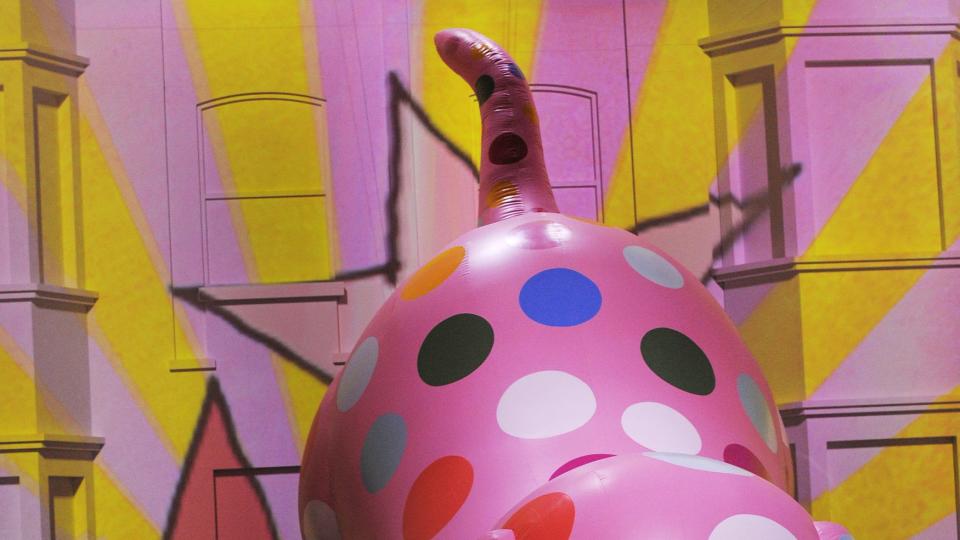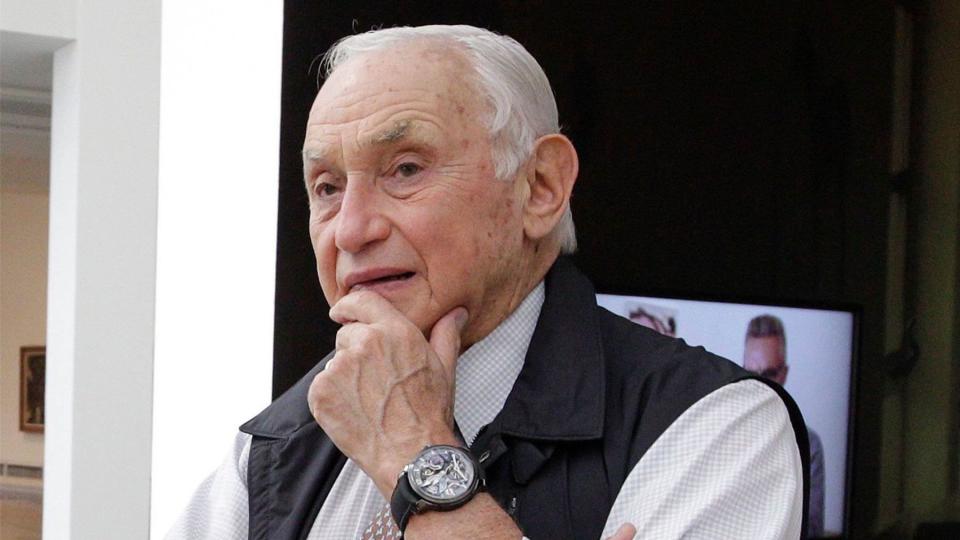Former Victoria's Secret Models Recall Wearing Provocative Child-Like Lingerie Adorned with Toys
- Oops!Something went wrong.Please try again later.
- Oops!Something went wrong.Please try again later.
Former Victoria's Secret models are speaking out as a new documentary explores the lingerie brand's rise to mainstream superstardom and its dark turn under former owner Leslie Wexner, who had business connections to disgraced sex offender Jeffrey Epstein.
Hulu's 3-part docuseries Victoria's Secret: Angels and Demons, streaming July 14, touches on how with the launch of the company's PINK line in the early 2000s — a brand targeted toward tweens and teenagers — both staffers and catwalk models felt uncomfortable with what they perceived as a change in the company's marketing from targeting adult women and men to making children feel bad about themselves.
One episode delves into 2012's Victoria's Secret Fashion show and the PINK collection runway segment that featured adult models holding and wearing candy-inspired accessories and playing with hula hoops, all while in their underwear.

Alex Tai/SOPA Images/LightRocket via Getty
Model Dorothea Barth Jörgensen, pictured below on the 2012 runway alongside Justin Bieber who performed that year at the annual VS Fashion Show in New York City, takes part in the documentary, directed by Matt Tyrnauer, and opens up about the problematic outfits.
"I had this dress with toy things [all] around and the whole set was pretty much based on toys," she explains. "My sister's children were so excited that I'd be going on the runway with Justin Bieber. They were so obsessed with him and they were like 10 and 12 at the time so I think definitely they hit the target."

Randy Brooke/WireImage
RELATED: Bella Hadid Says Decision to Return to Rebranded Victoria's Secret Was 'Very Complicated'
Former Victoria's Secret model Lyndsey Scott also reflects on her own child-like outfit during the 2009 show, sharing: "I was wearing balloons. They were not clothes, they were not sold in the stores."
Scott added: "It wasn't about the clothes as much as it was about the models fulfilling this idea of this fantasy that Victoria's Secret wanted to fulfill."

TIMOTHY A. CLARY/AFP/Getty
Later in the documentary Scott says that in hindsight, "I realize there were a lot of bad people who allowed bad things to happen."
Scott, as well as other industry insiders in the documentary, point at what they perceived to be a culture of misogyny that existed at the company under Victoria's Secret former chief marketing officer Ed Razek. According to a 2020 investigative report in the The New York Times, Razek had been accused of sexual harassment.
At the time the report was published, the Times spoke with over 30 current and former executives, employees and models.
Most allegations revolved around Razek, who stepped down from his position in August 2019, months after causing controversy over his comments about hiring transgender or curvy models for the Victoria's Secret Fashion Show. He has since apologized for the comments.
Several employees also complained about Razek's behavior, specifically referencing his "demeaning comments and inappropriate touching of women," according to the Times.
Razek denied the allegations, telling the Times, "the accusations in this reporting are categorically untrue, misconstrued or taken out of context," adding, "I've been fortunate to work with countless, world-class models and gifted professionals and take great pride in the mutual respect we have for each other."
In a statement shared with PEOPLE, Victoria's Secret addressed the documentary and shared that the brand has shifted and evolved since becoming a stand alone company in 2021.
"The company featured in this docuseries does not reflect today's Victoria's Secret & Co. When we became a stand-alone company in August 2021, we set out to regain the trust of our customers, associates and partners," a Victoria's Secret spokesperson tells PEOPLE. "Today, we are proud to be a different company, with a new leadership team and mission to welcome, celebrate, and champion all women. This transformation is a journey, and our work continues to become the Victoria's Secret our customers and associates deserve — where everyone feels seen, respected, and valued."
As part of the rebrand, Victoria's Secret has brought in Martin Waters as CEO and launched the VS Collective, aimed to positively impact women and provide a more inclusive environment for shoppers and employees, according to the brand.
Victoria's Secret also shared an Instagram post, writing "It's no secret. We've made mistakes, we're listening, we're learning and we're changing."
The last Victoria's Secret Fashion Show happened in 2018 in New York City. The 2019 fashion show was canceled as rising concerns began to surface about the brand's ethos and marketing strategies.
The Victoria's Secret Fashion Show launched in 1995 and soon became synonymous with supermodels like Naomi Campbell, Gisele Bundchen and Miranda Kerr hitting the runway in elaborate lingerie, wings and sleepwear designs year after year. It was first broadcasted on television in 2001 on ABC. The event was then broadcast on CBS from 2002 to 2017, returning to ABC for its last year.
In the documentary, an international expansion marketing video from the time shows how the brand switched its marketing strategy in the 2000s and went about "bringing in a steady stream of young customers who we can hold for decades."
RELATED: Gisele Bündchen Felt 'Uncomfortable' with Her 'Butt Hanging Out' on Victoria's Secret Runway
One throwback clip shows a young Karlie Kloss detailing how she grew up wanting to wear a pink robe like her idols and another shows former Chief Marketing Officer Ed Razek telling a room full of models backstage: "A lot of you were about 9 or 10 years old when we first started putting this show on CBS and I bet some of you thought, Boy, I hope someday I can do that."
However, even staffers admit they were apprehensive when they saw how VS was marketing the brand to millennials. A former employee shared that she believed PINK's strategy was to create FOMO — the fear of missing out — and didn't like that it made young people feel more insecure and excluded.
"For me that's when I felt like things were going in the wrong direction because PINK was targeted at teenagers and tweens. So, that did not feel good," the staffer shares in the documentary.
Victoria's Secret was founded in 1977 and eventually taken over by Wexner, who got the brand's famously sexy catalog through the nation's doors and gained the attention of women who viewed the imagery as aspirational and men who loved to browse through the pages.

Jay LaPrete/AP/Shutterstock
Wexner invented a savvy marketing story about the mythical founder of the brand, an inspirational English woman named Victoria who lived in London and whose husband was a barrister. The story was so convincing that even staff believed she existed and asked about when they would get to meet her, according to the three-part documentary.
RELATED: TikTok Star Remi Bader Hired by Victoria's Secret PINK as Brand Expands Its Size Offerings
Under his L Brands business, Wexner bought New York's Henri Bendel in the 1980s and Jackie Onassis attended the opening.
It was around that time that Epstein, a known business client and benefactor of Wexner's, began "worming his way into the lives of older successful Jewish men," Epstein's former business partner, Stephen J. Hoffenberg, says in the documentary. Epstein took care of billionaire Wexner's finances and Hoffenberg adds: "He could convince anything of anybody… the master manipulator."
The documentary explores the extent of Epstein and Wexner's working relationship. "Wexner had the money that Epstein was seeking. Wexner got from Epstein the glamour and smoothness that he was seeking. I'm not at all inferring that it was a sexual need but there was something there," Cindy Fedus-Fields, former CEO of Victoria's Secret Direct says of her perspective on businessmen's relationship.
RELATED: Heidi Klum Says It's 'Good' That Victoria's Secret Is Rebranding: 'About Time'
Epstein later purchased Wexner's NYC townhouse for $20 million and the business owner moved back to Ohio while Epstein shared control of Wexner's 20 companies, 19 trusts and different charitable foundations. The pair were known to do business until at least 2007.
In 2008 Epstein pleaded guilty in a Florida court to soliciting a person under 18 for prostitution. At the time, PEOPLE confirmed he was sentenced to 13 months in jail, although he served much of the time in work release at his office in Palm Beach. He was required to register as a sex offender. In 2019, Epstein was arrested after being accused of sex-trafficking girls as young as 14. He faced up to 45 years in prison if convicted, but was found dead in his New York jail cell that August before his case could go to trial.
RELATED: Victoria's Secret Sold for $525M Amid Months of Scandal as CEO of Parent Company L Brands Steps Down
Les Wexner released a statement in 2019 to clarify his relationship with Epstein. Wexner said that Epstein was "given power of attorney as is common in that context, and he had wide latitude to act on my behalf with respect to my personal finances while I focused on my company and undertaking philanthropic efforts."
After allegations emerged that Epstein said he was a recruiter for Victoria's Secret, a spokesperson for the company told CNBC "he was never employed by nor served as an authorized representative of the company."
In July of 2019, L Brands disclosed it had hired outside counsel to review the company's relationship with Epstein. The company maintained it had cut ties with Epstein nearly 12 years ago and called his alleged crimes "abhorrent."
For his part, Wexner maintains he severed ties with Epstein in the fall of 2007. At an L Brands investor meeting in September 2019 following Epstein's death, he told shareholders he was "embarrassed" to have had any connection to him.
"Being taken advantage of by someone who is ... so depraved is something I'm embarrassed I'm even close to," Wexner said to a room of investors. "In the present, everyone has to feel enormous regret for the advantage that was taken of so many young women."
Hulu's documentary Victoria's Secret: Angels and Demons premieres July 14.

